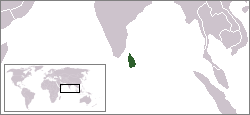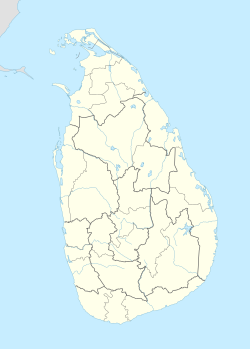
Sri Lanka, formerly known as Ceylon and officially the Democratic Socialist Republic of Sri Lanka, is an island country in South Asia. It lies in the Indian Ocean, southwest of the Bay of Bengal, separated from the Indian peninsula by the Gulf of Mannar and the Palk Strait. Sri Lanka shares a maritime border with the Maldives in the south-west and India in the north-west.

Parliamentary elections were held in Sri Lanka on 2 April 2004. The ruling United National Party of Prime Minister Ranil Wickremesinghe was defeated, winning only eighty two seats in the 225-member Sri Lankan parliament. The opposition United People's Freedom Alliance won 105 seats. While this was eight seats short of an absolute majority, the Alliance was able to form a government.

Islam is the third largest religion in Sri Lanka with about 9.7 percent of the total population. The main muslim concentrations occur in Eastern Province. Other areas with significant population, such as western, north western, north central, central and sabaragamuwa areas of, srilanka. Muslims form a large segment of urban population and mostly concentrated in major cities and large towns in srilanka. The Muslims usually speak Tamil language in Sri Lanka.
Freedom of religion in Sri Lanka is a protected right under Chapter II, Article 9 of the constitution of Sri Lanka. This applies to all religions, though Buddhism is given the foremost place under the 1978 Republican Constitution. Sri Lanka is regarded by its Supreme Court as being a secular state.
Human rights in Sri Lanka provides for fundamental rights in the country. The Sri Lanka Constitution states that every person is entitled to freedom of thought, conscience and religion, including the freedom to have or to adopt a religion or belief of his choice. And, that every person is equal before the law.

The 1958 anti-Tamil pogrom and riots in Ceylon, also known as the 58 riots, refer to the first island-wide ethnic riots and pogrom to target the minority Tamils in the Dominion of Ceylon after it became an independent dominion from Britain in 1948. The riots lasted from 22 May until 29 May 1958 although sporadic disturbances happened even after the declaration of emergency on 27 May 1958. The estimates of the murders range, based on recovered body count, from 158 to 1,500. Although most of the victims were Tamils, Sinhalese and their property were also affected by retaliatory attacks by Tamil mobs throughout the Batticaloa and Jaffna districts. As the first full-scale race riot in the country in over forty years, the events of 1958 shattered the trust the communities had in one another and led to further polarisation.
Sri Lankan state-sponsored colonization schemes is the government program of settling mostly farmers from the densely populated wet zone in the sparsely populated areas of the dry zone in the North Central Province, Southern Province, Uva Province, Sabaragamuwa Province, Northern Province and the Eastern Province regions near tanks and reservoirs being built in major irrigation and hydro-power programs such as the Mahaweli project to create farming and fishing communities. This has taken place since the 1950s.
Kalutara or Kalutota is a major city in Kalutara District, Western Province, Sri Lanka. It is also the administrative capital of Kalutara District. It is located approximately 43 km (27 mi) south of the capital Colombo. The city holds a unique position for one of the four major rivers in Sri Lanka, the Kalu Ganga, which joins the sea at the centre of the city. Kaluthara is known for making rope, baskets, and other articles from the fibre of the coconut palm. The area also produces the Mangosteens, a fruit introduced from Malaysia in the 19th century.

Polonnaruwa District is one of the 25 districts of Sri Lanka, the second level administrative division of the country. It is also one of the two districts of North Central Province and has an area of 3,293 km2.
The cow protection movement is a predominantly Indian religious and political movement aiming to protect cows, whose slaughter has been broadly opposed by Hindus, Buddhists, Jains, Zoroastrians and Sikhs. While the opposition to slaughter of animals, including cows, has extensive and ancient roots in Indian history, the term refers to modern movements dating back to colonial era British India. The earliest such activism is traceable to Namdhari (Kooka) Sikhs of Punjab who opposed cow slaughter in the 1860s. The movement became popular in the 1880s and thereafter, attracting the support from the Arya Samaj founder Swami Dayananda Saraswati in the late 19th century, and from Mahatma Gandhi in the early 20th century.

The 1956 anti-Tamil pogrom, also known as the Gal Oya riots, was the first organised pogrom against Sri Lankan Tamils in the Dominion of Ceylon. It began with anti-Tamil rioting in Colombo, followed by anti-Sinhalese rioting in Batticaloa. The worst of the violence took place in the Gal Oya valley, where local majority Sinhalese colonists and employees of the Gal Oya Development Board commandeered government vehicles, dynamite and weapons and massacred minority Tamils. It is estimated that over 150 people died during the violence. The police and army were eventually able to bring the situation under control.

Bodu Bala Sena, is a Sinhalese Buddhist nationalist and extreme nationalist organisation, which is a break-away organisation from the right-wing nationalist Jathika Hela Urumaya organisation. The BBS generally opposes pluralist and democratic ideologies, and criticizes non-extremist Buddhist monks for not taking action against the rise of Western religions within Sri Lanka.
Buddhist scripture condemns violence in every form. Ahimsa, a term meaning 'not to injure', is a primary virtue in Buddhism. However, Buddhists have historically used scriptures to justify violence or form exceptions to commit violence for various reasons. As found in other religious traditions, Buddhism has an extensive history of violence dating back to its inception. This article discusses Buddhist principles with regard to violence, and also provides certain, historical instances concerning the use of violence by Buddhists, including acts of aggression committed by Buddhists with political and socio-cultural motivations, as well as self-inflicted violence by ascetics or for religious purposes. Despite these historical instances, as far as the Buddha's teachings and scriptures are concerned, Buddhism discourages violence for resolving conflicts. Contemporary violence, or the promotion of violence, has been on the rise in some Buddhist communities, most notably the persecution of the Rohingya by the Myanmar government.
The 1915 Sinhalese-Muslim riots was a widespread and prolonged ethnic riot in the island of Ceylon between Sinhalese Buddhists and the Ceylon Moors. The riots were eventually suppressed by the British colonial authorities.
The 2014 anti-Muslim riots in Sri Lanka were religious and ethnic riots in June 2014 in south-western Sri Lanka. Muslims and their property were attacked by Sinhalese Buddhists in the towns of Aluthgama, Beruwala and Dharga Town in Kalutara District. At least four people were killed and 80 injured. Hundreds were made homeless following attacks on homes, shops, factories, mosques and a nursery. 10,000 people were displaced by the riots. The riots followed rallies by Bodu Bala Sena (BBS), a hard line Buddhist group. The BBS was widely blamed for inciting the riots but it has denied responsibility. The mainstream media in Sri Lanka censored news about the riots following orders from the Sri Lankan government.
Events in the year 2018 in Sri Lanka.
The Sri Lankan anti-Muslim riots were a series of religious riots targeting Muslims that began in the town of Ampara located in Sri Lanka on 26 February 2018, spreading to the Kandy District by March 2 until its end on March 10, 2018.

The 1987 Eastern Province massacres were a series of massacres of the Sinhalese population in the Eastern Province of Sri Lanka by Tamil mobs and Liberation Tigers of Tamil Eelam during the Sri Lankan Civil War. Over 200 Sinhalese were killed by mob and militant violence, and over 20,000 fled the Eastern Province. The violence has been described as having had the appearance of a pogrom.
The Sri Lankan anti-Muslim riots were a series of religiously motivated riots targeting Muslims in Sri Lanka. The riots originated as isolated incidents in the aftermath of the Easter bombings in the nation, beginning in Chilaw and subsequently spreading to much of the Northwestern Province.






